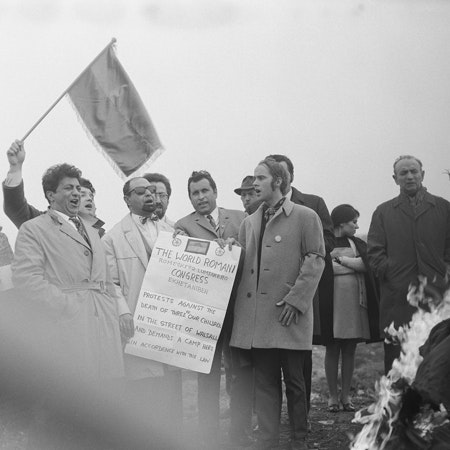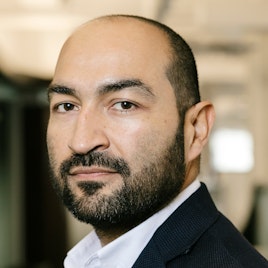Roma in Political Life in Europe: Introduction
By Chuck Sudetic & Zeljko Jovanovic

Why have so many Roma communities in Europe failed to elect Roma representatives to voting positions on government bodies where they would be positioned to press for better housing, health care, schools, jobs for Roma people, and respect for their civil and human rights? We explore aspects of this question in a series of articles about Roma political participation in France, Hungary, Romania, Macedonia, Bulgaria, and the Czech Republic.
For generations, the factious, culturally variegated Roma have separated humanity into two groups. On the one side, they place themselves, “the people,” a literal translation of the word Roma. On the other side, they place everyone else, the “outsiders,” whom the Roma call gadje in the plural and gadjo in the singular.
Over the centuries, many efforts have been undertaken to help reduce the isolation and poverty of the Roma people. These were mostly individual efforts undertaken by gadje, some of whom recognized inequities and injustices and sought to correct them by intervening personally or by wielding their influence with other gadje who controlled political and religious institutions.
Moving Toward the Mainstream: The Postwar Era
After the horrors of World War II, communists, practically all of them gadje, seized power in Eastern Europe. Gadje law backed by gadje-controlled police forced many Roma to begin leading sedentary lives and to take jobs in factories and other enterprises. Significant numbers found their way into the mainstream of society, still proudly Roma, but also proudly employed, proudly residing in their own apartments, and proudly sending their children to school.
But in these dictatorships, the Roma remained as disenfranchised as anyone else who was not a Communist Party member. Popular prejudice continued to lurk in the shadows. As a result, most Roma people continued to live in squalor. Many continued to work the most menial and least paying jobs society had to offer. Many did not attend school, and many of those who did attend found themselves in segregated classes receiving substandard instruction.
In the democratic, free-market countries of the West, practically everyone benefited from economic boom times. New housing, new factories, new hospitals, and new schools rose from the wreckage left by the two world wars. Roma in Western countries began enjoying a quality of life significantly superior to that of their parents but significantly inferior to that of almost all gadje around them.
The Persistence of Inequality
Since the fall of the Iron Curtain and the development of the political, judicial, and economic superstructure of the European Union, organizations and individuals have undertaken unprecedented efforts to alleviate the wretched conditions that so many Roma have suffered in the areas of housing, health, education, human and civil rights, and employment.
Roma-run nongovernmental organizations have managed some of these efforts at the local level, but gadje-controlled organizations—some of them government institutions, others nongovernmental organizations—have financed them all and guided most. Practically all of these institutions have stressed that their higher goal is to help the Roma win respect for their human rights and assume their deserved place in the mainstream of European society.
The primary focus on housing, health, education, and employment, however, has in some areas yielded results that are uncomfortably reminiscent of the results of efforts the colonial powers once undertook to improve the quality of life of dissatisfied and disenfranchised aboriginal people in lands whose resources and markets the powers wanted to continue to exploit without ceding significant political power.
Some progress has been registered, perhaps especially in the personal development of unprecedented numbers of educated young Roma people, who are more confident and less deferential than their parents and grandparents. But structural segregation, a dependency culture enabled by nongovernmental and international organizations, and pervasive racism and racist violence continue to distance many Roma families and groups from the greater society.
Too many Roma sell the future short and invest most of their time and energy in meeting immediate basic needs—a struggle to survive made all the more difficult by discrimination and violations of human rights, including police brutality and a lack of police protection, as well as insufficient recourse to the judicial system. Too many Roma have fallen into debt to Roma loan sharks, a condition that reduces them to a level of destitution and dependency resembling indentured servitude. Too many suffer the effects of illiteracy spanning generations and inadequate proficiency in the languages of the majority peoples in whose midst they reside. Too many still lack sufficient knowledge or understanding of the opportunities and pitfalls the modern world presents.
So glaring are these deficiencies that Roma all over Eastern Europe are willing to sell their votes for a sack of flour or surrender them in the face of intimidation by the loan sharks to whom they are indebted.
The Path to the Future
Today—almost a quarter-century since the fall of the Berlin Wall and the beginning of unprecedented efforts to include Europe’s Roma in European society—the Roma, depending on the country where they reside, have either failed to secure perhaps the most crucial of all inalienable rights or failed to exercise this right in a manner that best serves their interests as individuals and as a people.
This inalienable right is the right to participate in public and political affairs, a sine qua non for any group of individual citizens who join together because they face the same existential challenges or share the same legitimate interests and seek to assert themselves in an open society. The need to secure and exercise this right has arguably received too little effective attention from organizations, institutions, and individuals focusing on the Roma. Instead, entire structures continue to entrench a mutual dependency between Roma and these same organizations.
It is now clear that no solutions to the critical problems Roma face in the areas of housing, health care, education, and employment will be lasting without the equal participation of the Roma in political life.
For example, in northeastern Hungary, the Roma “minority” in some towns accounts for up to 50 percent of the population, yet the Roma have no voting representatives on elected local councils. How is it possible to ignore the issue of political power in such an environment, especially when racist extremists commit serial murders and form black-shirted vigilante groups like the fascist militias that, within living memory, sent thousands of Roma to death camps? And isn’t it clear that a lack of political power contributes to employment discrimination and the lack of economic opportunities in Romania are helping to drive the migration of Roma people to France and other Western countries?
If the Roma are ever to assert themselves effectively, without fear or manipulation, in an open, democratic society, then it is necessary to ensure that Roma of voting age possess political power whose degree and breadth is in proportion to their numbers and will give them leverage to strike mutually beneficial agreements with the dominant peoples and other minorities in the countries and local areas they inhabit.
Acquiring political power will require the Roma to move beyond the largesse of the gadje and tap their own political and economic potential. This means self-organization, rooting out structural obstacles entrenching dependency among new generations of Roma, overcoming the oppression of loan sharks and vote brokers, enhancing efforts to obtain accurate counts of Roma in censuses, and improving voter education, registration, and turnout programs.
It requires demanding change from the institutions that write, adopt, and implement laws and regulations. It requires efforts to press the greater society—through their governments and courts—to honor the guarantees of civil and political rights already enshrined in their constitutions and to enforce laws on electoral corruption, electoral violence, and hate speech. It requires developing personal confidence among the Roma, and enough trust to make them willing to back worthy Roma candidates and provide their campaigns financial support. It will require nominating a new generation of Roma candidates for government positions, organizing election-day turnouts, and demanding proportional numbers of Roma in the civil service and judiciary.
The change in question is not just about or for Roma. It concerns every group underrepresented in or excluded from meaningful participation in public and political life and the quality and nature of democracy in Europe. The empowerment and inclusion of these groups in public and political life must be a priority for the European Union and its member states.
This article is part of a series examining Roma political participation in France, Hungary, Romania, Macedonia, Bulgaria, and the Czech Republic.
Until November 2013, Chuck Sudetic was a senior writer for the Open Society Foundations.

Until February 2024, Zeljko Jovanovic was director of the Roma Initiatives Office.